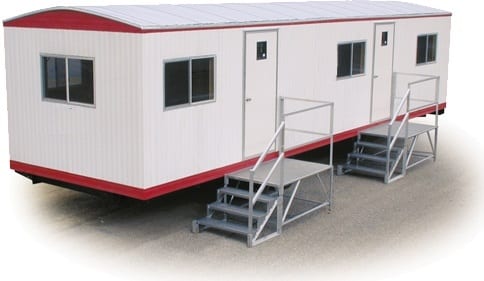
A Comprehensive Checklist for Inspecting Used Construction Trailers
Construction trailers, commonly referred to as job-site trailers, play a pivotal role in the construction industry. They serve as on-site offices, storage spaces, meeting rooms, and even temporary housing in some instances. When venturing into the market of used construction trailers, it’s crucial to ensure that the one you invest in is of top-notch quality and will serve your needs without unforeseen costs or challenges.
Buying used construction trailers can be an economical choice, especially for smaller businesses or short-term projects. However, the key lies in thorough inspection and understanding what to look out for. Here’s a comprehensive checklist to guide you through the process:
1. Exterior Inspection
Frame and Chassis:
- Rust and Corrosion: Check the frame for signs of excessive rust or corrosion. Minor surface rust can be treated, but deep rust may compromise the trailer’s structural integrity.
- Welds: Ensure that all weld points are solid and show no signs of cracking or separation.
Siding and Roof:
- Look for dents, holes, or significant wear. Any breach in the siding can allow water and pests inside.
- Check the roof for any signs of sagging, which can indicate structural issues or previous water damage.
Doors and Windows:
- Ensure all doors and windows open and close smoothly. Seals should be tight to prevent drafts or water leaks.
- Locks should function correctly for security purposes.
Tires and Axles:
- While construction trailers aren’t frequently moved, it’s essential that tires are in decent condition and axles are rust-free and functional, especially if relocation is on the horizon.
2. Interior Inspection
Flooring:
- Check for soft spots, which might indicate water damage or rot.
- Ensure that the floor is level and free of tripping hazards.
Walls and Ceiling:
- Look for signs of mold, water stains, or peeling paint, indicating past water damage.
- Ensure adequate insulation, especially if the trailer will be used during extreme weather conditions.
Electrical System:
- Test all light fixtures, switches, and outlets.
- Inspect the circuit breaker for any signs of wear or malfunction.
HVAC System:
- If the trailer has a heating or cooling system, test it to ensure it functions efficiently.
- Check for clean air filters and any signs of mold in the vents.
Plumbing (if applicable):
- Test all faucets and toilets, ensuring there are no leaks or malfunctions.
- Inspect any on-board water heaters or treatment systems.
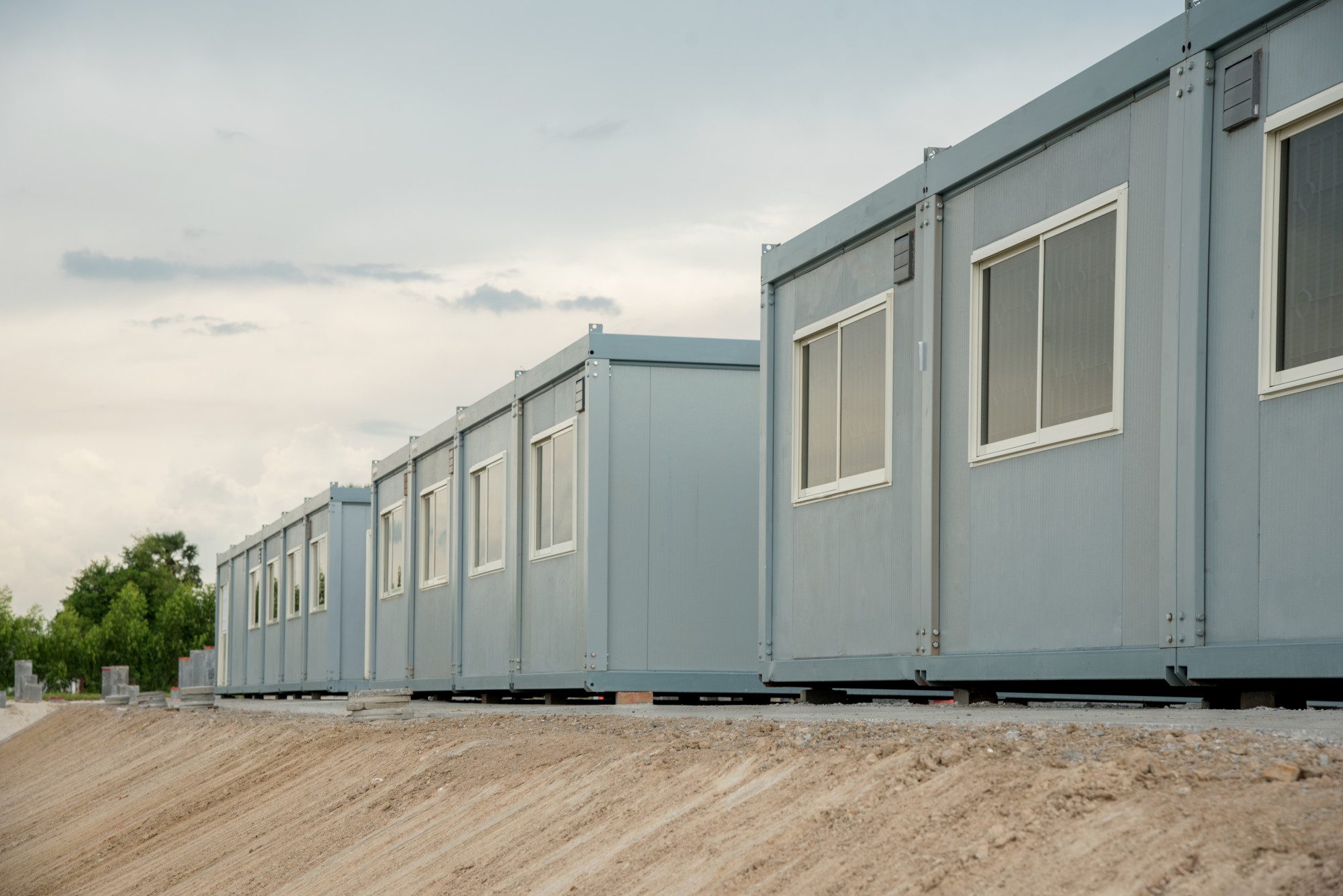
3. Functionality and Layout
- Ensure the trailer’s size and layout fit your intended purpose.
- Consider how easy it will be to modify or customize if your needs change.
4. Document Verification
- Ensure the title is clear and free of liens.
- Check for any warranties or service records to get a sense of the trailer’s history and maintenance.
5. Price Comparison
- Research the market to ensure you’re getting a fair deal.
- Remember, the cheapest option isn’t always the best. Factor in potential repair or modification costs.
Wrapping Up: The Value of Due Diligence
Buying a used construction trailer is an investment, and as with all investments, due diligence is crucial. Take your time, and if possible, involve an expert in the inspection process. The goal is to secure a functional, durable trailer that provides value for money and supports the successful execution of your construction projects. With the above checklist in hand, you’ll be well on your way to making an informed purchase.
Top 10 Reliable Used Construction Trailer Suppliers
The demand for used construction trailers has been steadily rising, given their cost-effectiveness and versatility. While there are many suppliers in the market, it’s crucial to identify those known for reliability and quality. Below is a list of ten reputable suppliers, based on customer reviews, industry reputation, and the variety of inventory:
- ModSpace: A leading provider in the modular space industry, ModSpace offers a wide variety of quality used construction trailers suitable for various purposes, from on-site offices to storage units.
- WillScot: Renowned for their impeccable customer service and a broad inventory range, WillScot has positioned itself as a trusted supplier in the used trailer market.
- Pac-Van: This nationwide company boasts an impressive selection of modular buildings, including construction trailers. Their extensive network makes it easy for customers across the U.S. to find what they need.
- Mobile Mini Solutions: Not just limited to storage containers, Mobile Mini also offers an array of construction trailers, known for their durability and quality.
- Satellite Shelters: With a customer-centric approach, Satellite Shelters provides both new and used modular solutions, tailored to fit the specific requirements of clients.
- Vanguard Modular: This company offers a range of modular building solutions, including used construction trailers. Their focus on sustainability and eco-friendliness adds another layer of appeal.
- Design Space Modular: With over a decade in the industry, Design Space Modular delivers both reliability and quality, making them a favorite among many construction companies.
- Aries Building Systems: Catering to both large corporations and smaller businesses, Aries offers a diverse range of used construction trailers, emphasizing quality and customer satisfaction.
- USAMobileOffices.com: As the name suggests, this platform connects buyers with a plethora of mobile office solutions, including used construction trailers, ensuring a transparent buying process.
- 360 Mobile Office: This online platform specializes in connecting businesses with mobile office suppliers. Their vast network ensures customers can find a trailer that fits their specifications and budget.
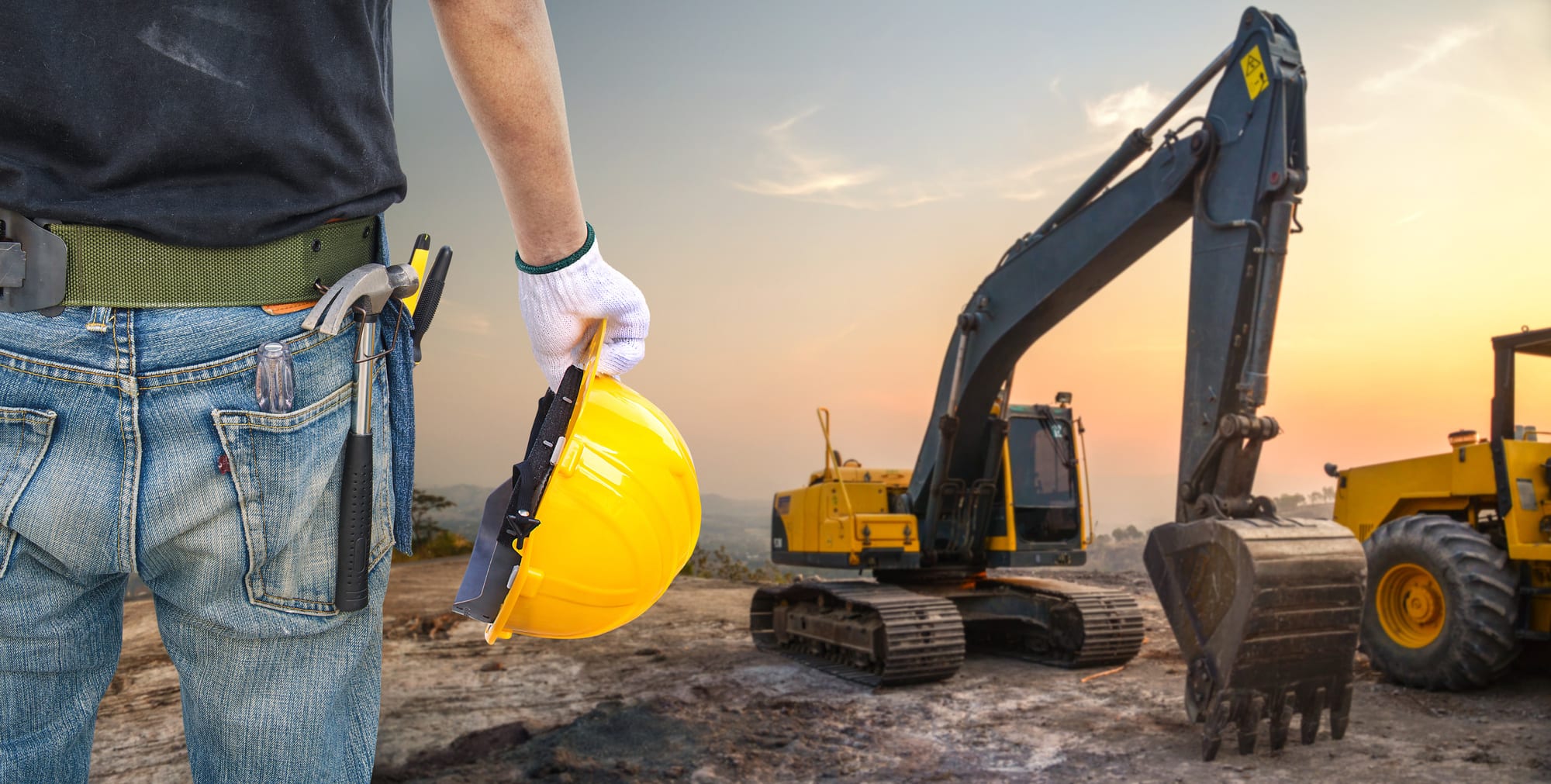
When looking to invest in a used construction trailer, always prioritize suppliers with a proven track record, transparent business practices, and a commitment to customer satisfaction. With these top suppliers as a starting point, finding a reliable and quality trailer for your needs becomes a much smoother process.
Benefits of Used Construction Trailers
Investing in used construction trailers can offer numerous advantages for businesses in the construction industry and beyond. Whether you’re a startup on a tight budget or a well-established company looking for a flexible solution, these trailers can cater to a myriad of needs. Here are some prominent benefits that have made used construction trailers an attractive choice for many:
Cost-Effective Solution
Purchasing a brand-new construction trailer can be a significant expenditure, especially for businesses that are still trying to establish themselves. Used trailers often come at a fraction of the price of new ones, making them a budget-friendly alternative without compromising on utility.
Quick Deployment
Used trailers are usually ready for immediate use. They can be quickly transported to the job site, reducing waiting times. This immediacy can be crucial in industries where time-sensitive projects are the norm.
Flexibility and Customizability
Most used construction trailers are adaptable. This means that if you need to repurpose them for different tasks – be it as an on-site office, storage space, or a meeting room – alterations can be made without major hurdles.
Environmental Considerations
By opting for used trailers, businesses contribute to reducing waste and the demand for new raw materials. This choice is more environmentally friendly as it promotes reuse and extends the lifecycle of existing resources.
Wide Availability
With a plethora of suppliers and a vast inventory of used trailers in the market, businesses can easily find a unit that precisely fits their requirements. Whether it’s a specific size, layout, or feature set, the chances are high that a suitably used trailer is available.
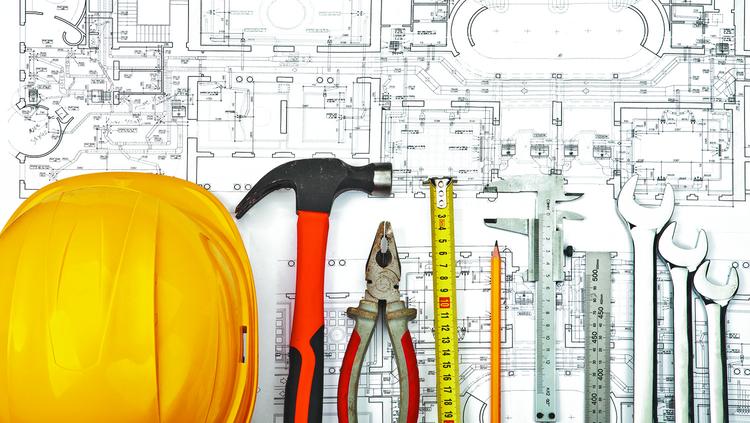
Depreciation Benefits
Just like cars and other assets, new construction trailers can depreciate quickly in their initial years. By purchasing a used trailer, businesses can sidestep this steep initial depreciation, ensuring a better resale value if they decide to sell the trailer in the future.
Tested Durability
A used construction trailer has already faced the rigors of real-world use. When a trailer is still in good condition after its initial usage, it’s a testament to its build quality and durability, giving potential buyers confidence in its longevity.
Meeting Short-Term Needs
For businesses with temporary requirements or short-term projects, used trailers present an ideal solution. Once the project concludes, the trailer can be resold, leased, or repurposed, providing flexibility without being overly capital-intensive.
Used construction trailers are not just a cost-effective alternative to new ones; they offer a slew of benefits that cater to the dynamic needs of today’s businesses. From environmental considerations to adaptability, these trailers have proven to be invaluable assets in various industries. When purchased from a reliable supplier and after thorough inspection, they can serve a business efficiently for years to come.
Understanding the Cost of Used Construction Trailers
When considering the purchase of a used construction trailer, understanding the cost is crucial. Various factors can influence the price tag, and being informed about these can help potential buyers make a well-informed decision. Here’s a deeper look into the cost factors and the average prices of used construction trailers:
Factors Influencing Cost
- Size and Layout: The size of the trailer is one of the primary determinants of its cost. Larger trailers with multiple rooms or specialized layouts will generally be more expensive than smaller, single-room units.
- Condition and Age: A newer trailer that’s been gently used will typically cost more than an older model showing signs of wear. The overall condition plays a significant role in determining value.
- Features and Amenities: Trailers equipped with HVAC systems, plumbing, insulation, or advanced security features may fetch a higher price.
- Brand and Manufacturer: Just like cars, certain brands or manufacturers might command a premium due to their reputation for quality, durability, and customer service.
- Demand and Supply: The price can also be influenced by the current market demand and availability. For instance, if there’s a sudden surge in construction activities in a region, the prices of used trailers might increase due to heightened demand.
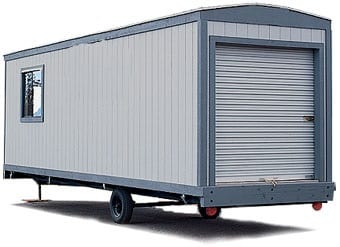
Average Costs
While it’s essential to consult local suppliers for the most accurate and up-to-date pricing, here’s a general idea of the average costs based on the data available as of 2023:
- Small Single-Office Trailers (8′ x 20′): These typically range from $10,000 to $20,000, depending on their condition and features.
- Medium-sized Trailers (10′ x 40′): A medium trailer can cost anywhere from $20,000 to $40,000. Again, the price variance is influenced by factors like age, condition, and amenities.
- Large Multi-room Trailers (12′ x 60′): Larger trailers, which might include multiple offices or spaces, generally range from $30,000 to $60,000.
- Specialized Trailers with advanced features: Units that are equipped with advanced HVAC systems, plumbing, high-grade insulation, or other specialized features can cost upwards of $70,000, depending on their size and condition.
While the above figures provide a general ballpark, it’s imperative to conduct thorough research locally and consult multiple suppliers. By understanding the factors influencing the cost and having a clear idea of one’s budget and requirements, businesses can find a used construction trailer that offers the best value for their investment.
Maintenance and Upkeep of Used Construction Trailers
Ensuring the longevity and usability of a used construction trailer isn’t just about the initial purchase; it also involves regular maintenance and care. Just like any other significant asset, used construction trailers require attention to detail to keep them in top condition. Here are some maintenance tips and information on the upkeep of these trailers:
Regular Inspections
It’s essential to regularly inspect the trailer for any signs of wear, damage, or potential issues. Look out for:
- Rust or corrosion, particularly at the joints or where metal components might be exposed to the elements.
- Leaks in the roof or around windows, which can lead to water damage or mold growth.
- Electrical issues such as faulty wiring, flickering lights, or non-functional outlets.
Cleaning and Sanitization
Keeping the trailer clean isn’t just about aesthetics; it can also prevent issues down the line:
- Regularly sweep and mop the floors to prevent dirt buildup.
- Wipe down surfaces to avoid dust accumulation, which can impact air quality and respiratory health.
- For trailers with bathrooms, ensure that plumbing is regularly checked and cleaned to prevent blockages.
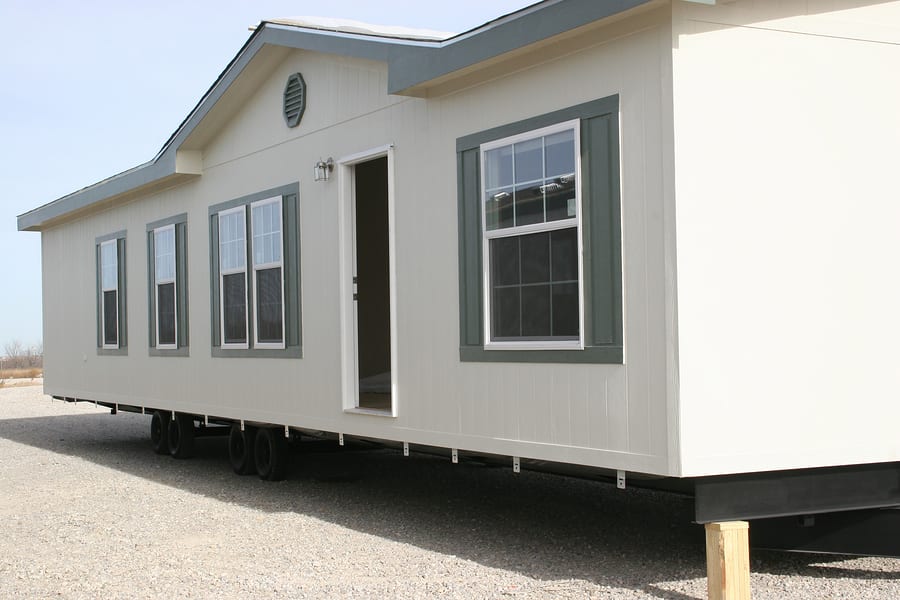
Climate Control
If your trailer has an HVAC system:
- Clean or replace filters regularly to ensure optimal air quality and efficient operation.
- Check for any irregular noises or reduced performance, as these could be signs of a malfunctioning system.
Security Measures
Ensuring the trailer is secure is crucial:
- Regularly inspect locks on doors and windows.
- If equipped with a security system or cameras, check them periodically to ensure they’re operational.
Repairs and Renovations
Over time, wear and tear are inevitable:
- Prioritize any repairs to prevent minor issues from escalating into major problems.
- Consider renovations or upgrades as needed, such as repainting, replacing old fixtures, or updating interior decor to keep the space fresh and functional.
Budgeting for Maintenance
Remember that upkeep has its own associated costs. While used construction trailers can be a cost-effective solution, it’s essential to set aside a budget for their maintenance. This ensures they remain in optimal condition, providing a conducive work environment and upholding their value.
The longevity and functionality of a used construction trailer are heavily influenced by how it’s maintained. By staying vigilant, regularly inspecting for issues, and addressing problems promptly, owners can ensure their trailer serves them well for years to come. Regular maintenance not only safeguards the investment but also ensures the safety and comfort of those using the trailer.
The Environmental Impact: Going Green with Used Construction Trailers
In our rapidly changing world, sustainability and environmental consciousness have taken center stage. The construction industry, notorious for its significant carbon footprint, is continually seeking methods to reduce its impact. One of these methods is the utilization of used construction trailers. Let’s delve into how opting for a used trailer can be an eco-friendly choice and how you can make your trailer even more green.
The Benefits of Reuse
Choosing a used construction trailer over a new one already has inherent environmental advantages:
- Resource Conservation: Constructing a new trailer involves the use of raw materials and energy. By opting for a used trailer, you’re essentially reducing the demand for these resources.
- Waste Reduction: Older trailers that are still in usable condition often get discarded or end up in landfills. By purchasing and repurposing them, you prevent this waste, leading to a significant reduction in environmental burden.
Green Upgrades
Even if your used construction trailer isn’t the epitome of sustainability, there are steps you can take to make it greener:
- Energy-Efficient Lighting: Swap out traditional bulbs for LED or other energy-efficient options. This not only reduces energy consumption but also saves on electricity bills.
- Solar Panels: Depending on the size and location of your trailer, installing solar panels can be an excellent way to harness renewable energy, further reducing your trailer’s carbon footprint.
- Insulation: Enhancing or updating the insulation in your used trailer can significantly improve its energy efficiency, especially if you’re using heating or cooling devices within the space.
- Green Building Materials: If you’re thinking about renovating or upgrading parts of your trailer, opt for sustainable materials. Bamboo, recycled steel, and reclaimed wood are excellent choices that are both durable and environmentally friendly.
Landscaping and Surroundings
The area around your construction trailer can also play a role in its eco-friendliness:
- Plant Trees: They offer shade which can reduce the need for cooling in hotter months. Plus, trees absorb carbon dioxide, further minimizing your overall carbon footprint.
- Rainwater Harvesting: Set up a system to collect and store rainwater. This can be used for landscaping or even as greywater in the trailer, depending on your setup and needs.
Educate and Advocate
Lastly, it’s essential to create awareness:
- Team Education: Ensure that everyone using the trailer understands the importance of the green initiatives in place. Simple actions, like turning off lights when leaving the trailer or using recycling bins, can make a considerable difference.
- Promote Sustainable Practices: As a user of a green, used construction trailer, you’re in a unique position to advocate for sustainable practices in the broader construction industry. Share your successes and encourage peers to consider similar eco-friendly choices.
While used construction trailers are already a step in the right direction for sustainability, there’s a lot more that can be done. By making thoughtful choices and investing in green upgrades, these trailers can become exemplary models of sustainability in the construction sector.
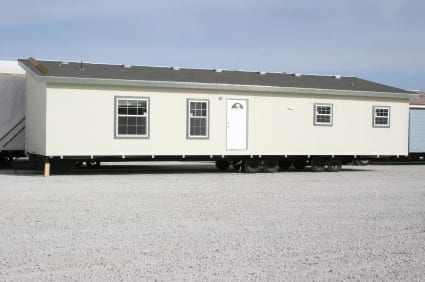
Navigating the Resale Market: Tips for Selling Your Used Construction Trailer
After having served its purpose for your needs, there might come a time when you want to sell your used construction trailer. Whether you’re upgrading, downsizing, or simply moving on from the project, understanding the resale market can help you get the best returns on your investment. Here are some strategies and insights to keep in mind when you decide to navigate this marketplace:
Proper Evaluation
Before listing your trailer for sale:
- Assess its Condition: An honest assessment of the trailer’s current state will help in setting a realistic price. Check for damages, the functionality of all features, and the overall wear and tear.
- Get a Professional Inspection: Having a professional inspector go over the trailer can provide an official report on its condition. This not only helps in establishing trust with potential buyers but can also give you a list of potential repairs that could increase the trailer’s value.
Highlight Upgrades and Maintenance
If you’ve made any upgrades or consistently maintained the trailer:
- Document Everything: Keep a record of all maintenance activities, upgrades, and repairs. This log can be shared with potential buyers to vouch for the trailer’s good condition.
- Photograph the Best Features: High-quality photos showcasing the trailer’s best aspects can make your listing stand out. Ensure the images are well-lit and cover multiple angles.
Setting a Competitive Price
- Research the Market: Look into the prices of similar trailers in the market. Take note of their condition, features, and size when comparing.
- Be Open to Negotiation: While it’s essential to set a fair price, being flexible and open to reasonable negotiation can speed up the sale process.
Marketing and Listing
- Leverage Online Platforms: Websites dedicated to construction equipment resale or broader platforms like Craigslist can be effective places to list your trailer.
- Use Your Network: Sometimes, the best deals come from word of mouth. Let your industry contacts know you’re selling.
Facilitate the Sale Process
- Be Transparent: Honesty about any flaws or issues with the trailer will build trust and reduce the chances of disputes later on.
- Offer a Tour: If feasible, allow potential buyers to visit and inspect the trailer in person. This can often seal the deal.
Selling a used construction trailer requires a mix of market understanding, transparency, and effective marketing. By approaching the resale process strategically, you can ensure that you receive a fair price while providing the next owner with a valuable asset for their operations.
